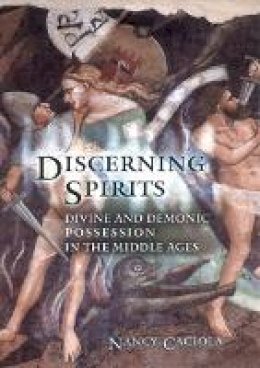
Discerning Spirits: Divine and Demonic Possession in the Middle Ages
Nancy Mandeville Caciola
Trance states, prophesying, convulsions, fasting, and other physical manifestations were often regarded as signs that a person was seized by spirits. In a book that sets out the prehistory of the early modern European witch craze, Nancy Caciola shows how medieval people decided whom to venerate as a saint infused with the spirit of God and whom to avoid as a demoniac possessed of an unclean spirit. This process of discrimination, known as the discernment of spirits, was central to the religious culture of Western Europe between 1200 and 1500.
Since the outward manifestations of benign and malign possession were indistinguishable, a highly ambiguous set of bodily features and behaviors were carefully scrutinized by observers. Attempts to make decisions about individuals who exhibited supernatural powers were complicated by the fact that the most intense exemplars of lay spirituality were women, and the "fragile sex" was deemed especially vulnerable to the snares of the devil. Assessments of women's spirit possessions often oscillated between divine and demonic interpretations. Ultimately, although a few late medieval women visionaries achieved the prestige of canonization, many more were accused of possession by demons. Caciola analyzes a broad array of sources from saints' lives to medical treatises, exorcists' manuals to miracle accounts, to find that observers came to rely on the discernment of bodies rather than seeking to distinguish between divine and demonic possession in purely spiritual terms.
Product Details
About Nancy Mandeville Caciola
Reviews for Discerning Spirits: Divine and Demonic Possession in the Middle Ages
Comitatus
Caciola brings to light lesser-known but textually documented visionaries of the Middle Ages, along with the big names, in her study of the fine line between 'delusional' and 'devotional' behaviors. In discussing these medieval women's behavior and writings, she highlights the fact that gender was often the factor that determined whether one was considered demonically or divinely possessed.... Caciola provides a perceptive piece of historical scholarship on a topic of great interest to religious studies and women's studies collections.
Library Journal
The groundbreaking work on exorcism manuals and the impressive range of sources handled throughout the book are particularly noteworthy. Moreover, the striking visual evidence is clearly presented, lucidly analyzed, and tightly interwoven with the rest of the argument. Scholars, graduate students, and even advanced undergraduates interested in the history of women, the church, and the body will profit from reading Discerning Spirits.
Speculum
The point of departure for this remarkable and bracingly refreshing book on female spirit possession in medieval France, Italy, and the Lowlands is the observation that divine possession and demonic possession manifested themselves in almost identical ways in the human body.... The author has a remarkable gift for language and an obvious delight in the well-chosen word; her sentences crackle with energy and shine with a luminous clarity.... Discerning Spirits is a masterful achievement.
Renaissance Quarterly
This book is a thoughtful and rich exploration of an important aspect of medieval religious culture. Discerning readers interested in spirituality, gender, or conceptions of the body in the Middle Ages will be well rewarded.
American Historical Review
